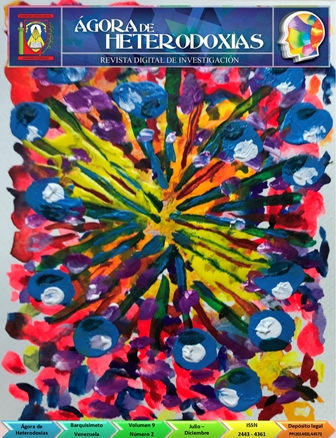Being and truth Are we facing the end of the era of truth?
DOI:
https://doi.org/10.5281/zenodo.8422803Keywords:
culture, epistemology, philosophy, ontologyAbstract
This essay presents preliminary reflections in relation to the new worldview of being within the framework of current epistemology. The purpose is to analyze the concept of being to understand how it is configured from another fundamental concept of philosophy: truth, theoretically approaching a definition of being, pondering about existence or non-existence. Through an analytical documentary review, it begins with a brief historical overview of the distinction of being by four authors who have dealt with the concept at different historical moments: Parmenides, Aristotle, Saint Thomas Aquinas and Heidegger, concluding that the denial of truth implies the denial of being.
Downloads
References
Arendt, H. (2005). La condición humana. Paidós.
Canal Ana Minecan. (19 de octubre de 2021). El Ser de Parménides. [Archivo de vídeo]. https://www.youtube.com/watch?v=niTl9-FRkCE
Cubillo, A. & Hidalgo, A. (2016). Transmodernidad y transdesarrollo. Ediciones Bonanza [Documento en PDF]. file:///C:/Users/msuarez/Documents/Lecturas/Transmodernidad_y_transdesarrollo_El_dec.pdf
Foucault, M. (1995). La arqueología del saber. Siglo XXI
Gamba Amaya, F. (2015). Bienvenidos al desierto de lo real. Universitas Philosophica, 65(32), pp. 339-346. https://doi.org/10.11144/Javeriana.uph32-65.rzdr
Gómez, E. & Letelier, G. (2023). La verdad de las cosas o si todo es relativo. Centro de estudios tomistas. Universidad santo Tomás. https://www.santotomas.cl/formacion-e-identidad/quienes-somos/capsulas/la-verdad-las-cosas-relativo-2/
Heidegger, M. (1952). De la esencia de la verdad. Revista cubana de filosofía, 10 (2), 5-22. https://www.filosofia.org/hem/dep/rcf/n10p005.htm
Iza Villacís, V.A. (2018). ¿Qué es la verdad? Una breve aproximación al sentido de la verdad en Heidegger y Levinas. Persona, educación y filosofía, 143-153. https://doi.org/10.7476/9789978104934.0009
López, J. (2000). Heidegger y la epistemología. [Tesis de Maestría en Filosofía, Universidad de Chile]. https://repositorio.uchile.cl/bitstream/handle/2250/108771/lopez_j.pdf?sequence=3&isAllowed=y
Lozano, V. (2004). Heidegger y la cuestión del ser. Espíritu LIII, 197-212. [Archivo PDF].
Martí, L.F. (14 de julio de 2021). El ser humano desde la filosofía tomista. Newsmedia Ipade Business School. https://www.ipade.mx/2021/07/14/el-ser-humano-desde-la-filosofia-tomista/
Martínez Miguélez, M. (2006). Ciencia y arte en la metodología cualitativa. Trillas.
Martínez Miguélez, M. (2012). El paradigma emergente. Trillas.
Murillo, J. (2000). Una aproximación al curso de Teoría del Conocimiento de Leonardo Polo. Acta Philosophica, 9(2), 319-338. [Archivo PDF]. https://dadun.unav.edu/bitstream/10171/41698/1/Una%20aproximaci%C3%B3n%20al%20Curso%20de%20Teor%C3%ADa%20del%20Conocimiento%20de%20Leonardo%20Polo.pdf
Órdenes Morales, M. (2018). Conocimiento y verdad según Tomás de Aquino. Revista Chilena de Estudios Medievales (14), 52-63. https://revistas.ugm.cl/index.php/rcem/article/view/210/pdf
Paván, C. (1999). Aproximaciones al concepto aristotélico de ontología. Apuntes filosóficos, 14, 65-81
Ortiz de Landázuri, M. (2016). De la biopolítica a la psicopolítica en el pensamiento social de Byung-Chul Han. Revista de Pensamiento e investigación Social, 17(1). https://doi.org/10.5565/rev/athenea.1782
Rodríguez Magda, R. (1989). La sonrisa de Saturno. Anthropos.
Rodríguez Magda, R. (18 de diciembre de 2021). Ni modernidad, ni posmodernidad: transmodernidad. El País. https://elpais.com/opinion/2021-12-18/ni-modernidad-ni-posmodernidad-transmodernidad.html?event_log=go
Villalobos Finol, O. (2002). El concepto de verdad de Hannah Arendt. Utopía y Praxis Latinoamericana, 16(7), 53-66. file:///C:/Users/msuarez/Documents/Dialnet-ElConceptoDeVerdadEnHannahArendat-2736953.pdf
Webdianoia. (s/f). Filósofos. Santo Tomás de Aquino. Webdianoia (Página web en línea). https://www.webdianoia.com/filosofia/index.htm
Published
How to Cite
Issue
Section
Copyright (c) 2023 Marian Suárez Rojas

This work is licensed under a Creative Commons Attribution-NonCommercial-ShareAlike 4.0 International License.
![]() Authors keep their copyrights so articles can be reused for teacher and research purpose. Readers and users can also reuse articles for the same purposes but not for commercial purposes. Ágora de Heterodoxias has no responsibility on information given by collaborators which is not necessarily the point of view of the publication
Authors keep their copyrights so articles can be reused for teacher and research purpose. Readers and users can also reuse articles for the same purposes but not for commercial purposes. Ágora de Heterodoxias has no responsibility on information given by collaborators which is not necessarily the point of view of the publication



